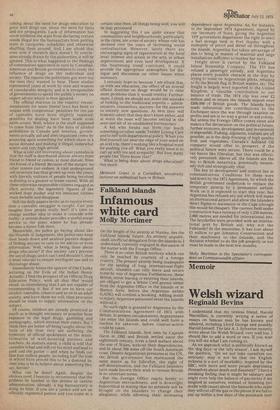Falkland Islands
Infamous white card
Molly Mortimer
On the length of the airstrip at Stanley, lies the Falkland Islands' future. An entirely unpublicised, unofficial delegation from the islands is, I understand, currently engaged in discussion of the matter with the Foreign Office. There is no other British territory which can only be reached by courtesy of a foreign country. The present airstrip being inadequate for the landing of long international-flight aircraft, islanders can only leave and return home by way of Argentina. Furthermore, these British, either leaving or entering their Islands, are obliged to get a White Card permit either from the Argentine Office in the Islands or in Buenos Aires, before the Argentine airline (LADE) will confirm a booking. Adding insult to injury, Argentine personnel enter the Islands without it.
No such right is granted to Argentina by the Communications Agreement of 1971 with Britain. In present circumstances, Argentinians can enter the Islands and could well form a nucleus for takeover, before counter-action could be taken.
The Falkland Islands, first seen by Captain Davis in 1592 and British settled since the eighteenth century, form a land surface about the size of Wales, without their dependencies, and lie about 300 miles off the South American coast. Despite Argentinian pressures at the UN, the British government has maintained the same stance as for Gibraltar, the right of self-determination, and the Falkland Islanders have made known their wish to remain British in no uncertain terms.
But the Foreign Office reacts feebly to Argentinian encroachment, and is downright hypocritical in stating that no pressure will be brought on the Islanders to change their allegiance, while allowing their increasing dependence upon Argentina. As, for instance, in the September 1974 Agreement, signed by our Secretary of State, giving the Argentine YPF government department the right to erect a fuel storage tank in Port Stanley with a monopoly of petrol and diesel oil throughout the Islands. Argentina has taken advantage of this to bring in masses of material and large installations sufficient to bunker her navy. Freight alone is carried by the Falkland Island Steamship Company. The FO has refused a passenger subsidy, and Argentina places every possible obstacle in the way by trying to insist on Argentinian pilots, refusing to fly the British flag in British waters, etc. The freight is largely wool exported to the 'United Kingdom, a valuable contribution to our balance of trade. The 1974 clip was over £2. million and in return the Islands import over £500,000 of British goods. The Islands have made substantial net contributions to the Exchequer since the war through taxation on profits and are in no way a grant-in-aid colony. But unless the Foreign Office comes clean and makes a flat declaration on the political future, further economic development and investment is impossible. Fishing, alginates, tourism are all possible, as is the deep-freezing of high quality fruit and vegetables. Canada's Ashland Oil company would offer to prospect, if the political future were secure. There could be a tax haven like Gibraltar, but this was effectively prevented. Above all, the Islands are the key to British Antarctica, potentially immensely rich and strategically vital.
The key to development and control lies in communications. Conditions for these were laid down by the 1971 Agreement, by which the British government undertook to replace the temporary airstrip by a permanent airfield. Work on it is expected to start this year, but Argentina has refused any aid which will make an international airport and allow the Islanders direct flights to Ascension or the Cape (though this would be cheaper). The current field under construction has a runway of only 1,250 metres; 2,000 metres are needed for international jets. The Seychelles were provided with an international port by British aid; why not the Falklands? In the meantime, it has cost about £1 million to get Johnston Construction and their machinery to the .Islands, and the decision whether to do the job properly or not must be made in the next few months.
Molly Mortimer is the Spectator's correspondent on Commonwealth affairs
Memoir


































 Previous page
Previous page